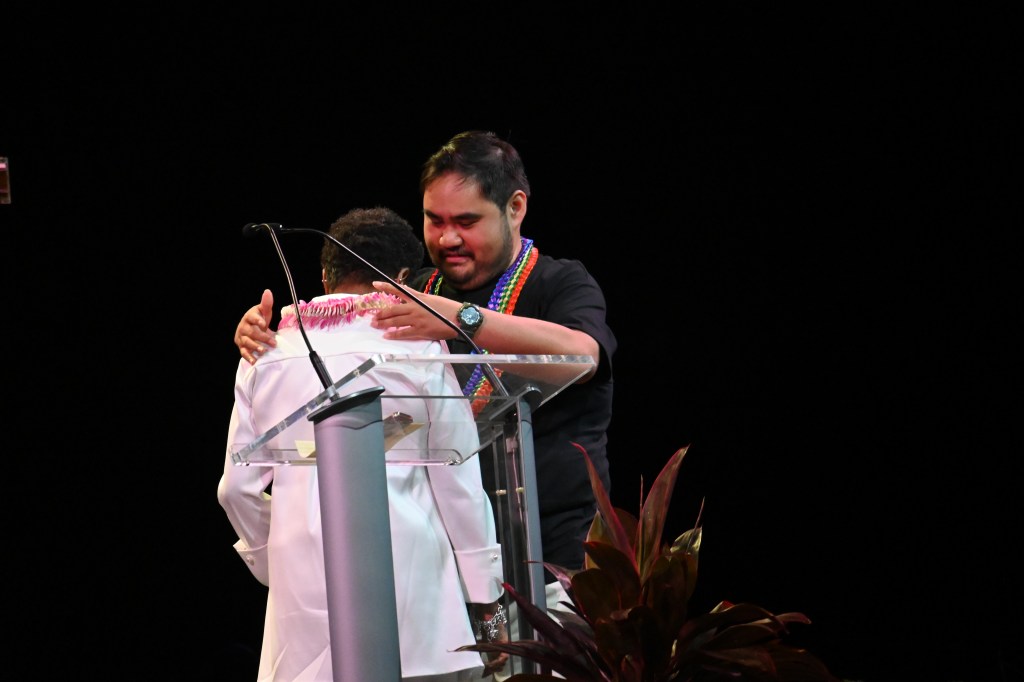
Author’s Note: This sermon was written for the installation of Kahu Keoki Kiwaha as Pastor of Puka’ana Congregational Church UCC in Captain Cook, Hawai’i. Unfortunately I fell ill and was unable to deliver it. I am deeply grateful to the Rev. Jonathan Roach for taking on that task, literally reading it in the car on the way to the church that Saturday morning.
Kahu Kiwaha has my best wishes and fervent prayers as he begins the work of his calling as Pastor and Teacher, and I look forward to many years of shared ministry.
January 13, 2024
Exodus 3:1-12
Luke 22:14-20, 24-27
When a kahu is first installed or ordained, they make the choice of the Scripture for that ordination or installation service. Other kahu look carefully at their selection, which most of the time, unsurprisingly, is a call story: one of the prophets, one or more of the disciples, perhaps an apostle. It says a lot about how they understand God’s call to them, about the ministry they believe they’ll undertake, even about their ongoing relationship with God.
So I eagerly awaited the word: whose call story would Keoki Kiwaha choose? And it was: Moses.
Wait. Moses?
Moses.
Oh, dear. Keoki, you poor unfortunate soul.
Moses had about as unwelcome a call, and as challenging a ministry, and as unsatisfactory a fulfillment of his ministry, as you can imagine. He was just out watching sheep, when the burning bush and the divine voice called. He was directed to perform the simple task of freeing the people of Israel from Pharoah, and later to guide them to their ancestral home. In the end, he died on a hilltop, gazing at the promised home that he would not reach.
Keoki, I am so sorry. And this certainly explains why you’ve been holding God’s call at arm’s length for so long.
Moses may hold the record for most protests offered to God by a summoned prophet. I count four. One: “Who am I?” Two: “Who are you?” – a good question when a deity starts giving you directions, actually. Three: “They won’t believe me or listen to me.” Four: “I’m a lousy public speaker.”
Four protests. Actually, four unsuccessful protests. Take note. God was more stubborn than Moses. God is more stubborn than you.
Cheryl Lindsay writes at ucc.org, “A common thread in biblical call narratives is the inherent insufficiency of the called. Some are reluctant due to the costs associated with the work. Others question that God is actually seeking them. Nearly all considered themselves ill-equipped for the assignment that God invites them to fulfill.” Dan Clandenin echoes that at JourneyWithJesus.net: “No one in their right mind would think themselves worthy or capable of that call — or any call, for that matter. To speak the unspeakable. To name the Unnameable. The presumption. The audacity. The futility. To remove your sandals and stand on ‘holy ground.’”
Of course you’re not “worthy.” Who is? What you are is the one God called. You have everything you need, or you have the ability to learn everything you need, or you will grow into what you need, and what did God say when Moses asked, “Who am I?”
God said, “I will be with you.”
God says the same to you, Keoki.
Like Moses, you have things to learn. Please learn not to whine as much as Moses. My goodness, he could whine. Yes, the people are hungry. Yes, the people are thirsty. Yes, you don’t know how to find the food and the water not just to satisfy but to nourish them. But you don’t need to go to God and say, “They’re about to kill me.” If they are, God knows that and doesn’t need to be reminded. If they’re not – and they’re probably not – God knows that, too, and do you really need to hear the divine sigh that goes with the divine rolling of the eyes?
“The people are hungry and the people are thirsty and God, I don’t know what to do. I need your help.”
Why couldn’t Moses learn that prayer?
You could also learn to delegate better than Moses. It’s a low bar. One of his regular whines was that everybody depended on him. Because he was really bad at assembling a team of leaders to support his community. Who told him he needed help? Everybody. His family. His father-in-law. The elders he ought to have equipped. His designated successor, Joshua. God. I mean, everybody knew that Moses overdid it.
You have congregational leaders who have done this for a long time. I know that leads to the frustration of “We’ve always done it that way” – but you folks here at Puka’ana know not to say that, right? Some of the things we’ve always done that way – which haven’t always been done that way, just done that way in living memory and sometimes not even that – some of those things are done that way because they work. Some of them don’t work any more. Some of them never did work but it looked like they did. Together you’ll figure out what’s good, what’s better, and what we can leave behind because the past is where it belongs.
Moses… wasn’t good at that.
Moses also wasn’t good at getting support from other leaders around him. You have colleagues on this island, on other islands, and throughout the United Church of Christ. You have access to an educational system that has been equipping kahu for about four hundred years – which, I have to admit, sometimes falls into the category of “perhaps we ought to change this process just a lot.” Get the support you’ll need.
Moses wasn’t good at that.
He was good at staying centered in God’s call – eventually. He kept his focus on the freedom of his people. He kept his focus on their survival. He kept his focus on the standards by which they would live. He kept his focus on their journey with God. None of those tasks were easy, by any means. If Moses had gone after the frequent distractions, however, far too many of them might have failed.
Be clear in your call. That’s not a one-and-done. The fact that you’ve accepted a call to leadership in Christ’s Church at this moment does not define how you live out that call in the coming years. It will shift and it will change. The world’s needs are not constant, so God’s call is not changeless. God’s love, yes. The ministry you do to express God’s love: that is new with the dawn. Be clear in your call.
Moses’ first call was to human freedom. I think that may be a common element for most calls to ministry. Whether it is freedom of the body, or release of the mind, or the unburdening of the soul, God has consistently called prophets and apostles and a Messiah to set my people free.
Be clear in your call.
Remember that you are not Moses. You are Keoki. Keoki has strengths and abilities that Moses did not. You, for example, do not need somebody else to speak for you. You can sing like Miriam as well as speak like Aaron. So you don’t need to make Moses’ mistakes, either. You can make Keoki’s mistakes. I assure you that I’ve found it much easier to make Eric’s mistakes than those of Jeremiah, my own Biblical call icon.
Learn from Moses’ mistakes as well as his successes. Learn also from Keoki’s mistakes and from your successes.
You have a long road ahead, Kahu, and I suspect that like Moses’ journey, the one thing it will not resemble is a straight line. As Harry Chapin sang, “There’s no straight lines make up my life, and all my roads have bends.” Lean with the curves. Lean into the curves. Slow down where you have to, because roadside ditches are unpleasant and the plummeting cliffs that are their alternatives are worse. As I found one day on a road on Maui, sometimes you’ll have to back up and let others go by or things will go very badly indeed.
And… don’t be surprised when you don’t reach the Promised Land in this lifetime.
Commentators over the centuries have spilled a lot of ink over Moses’ death before he reached the Promised Land. Why why why didn’t he make it over the Jordan River? Was it fair? Was it right? Was it consistent with the mercy of God?
Our journey to the Promised Land, however, isn’t one that ends in this lifetime. In this lifetime, we labor and lead and preach and teach for a community that more closely resembles the Peaceable Realm of God. Nobody – including Moses, including Isaiah, including Jeremiah, including Ezekiel, including Mary, including Simon Peter, including Paul of Tarsus, including Jesus – have established the Peaceable Realm on Earth. People have gotten closer. People have stepped further away. But reached it? No.
With all the best wishes for your success in ministry and with all appreciation of your talents and with all anticipation of your growing skills, you’re not going to get there either. Not in this life.
It’s the grace of God that, in the end, sustains us throughout our Earthly journey. It’s the grace of God that, in the end, guides us in sight of our destination. It’s the grace of God that, in the end, makes the bridge from this life, through death, to the goal toward which we’ve labored. It’s the grace of God that, in the end, will bring us home.
Moses. Really? Well. God bless you.
God blessed the world when Moses was called. God blessed the world when Keoki was called. God bless us all as we find our freedom and make our way to God’s eternal home.
by Eric Anderson
The photo of Keoki Kiwaha (r.) presenting a lei to the newly elected General Minister and President of the United Church of Christ, the Rev. Dr. Karen Georgia Thompson, was taken in July 2023 by Eric Anderson.

 This meditation was delivered at the closing worship service of the Hawai’i Conference Clergy Retreat on Wednesday, March 8, in Kailua-Kona, Hawai’i Island, Hawai’i.
This meditation was delivered at the closing worship service of the Hawai’i Conference Clergy Retreat on Wednesday, March 8, in Kailua-Kona, Hawai’i Island, Hawai’i.








